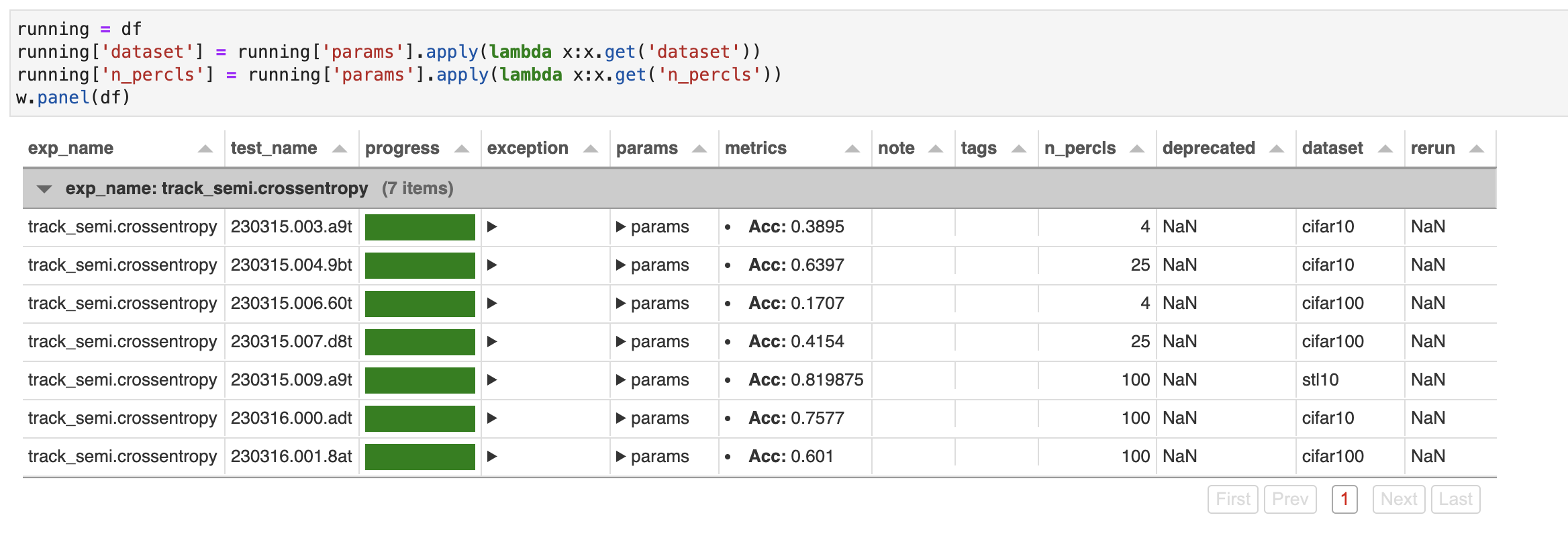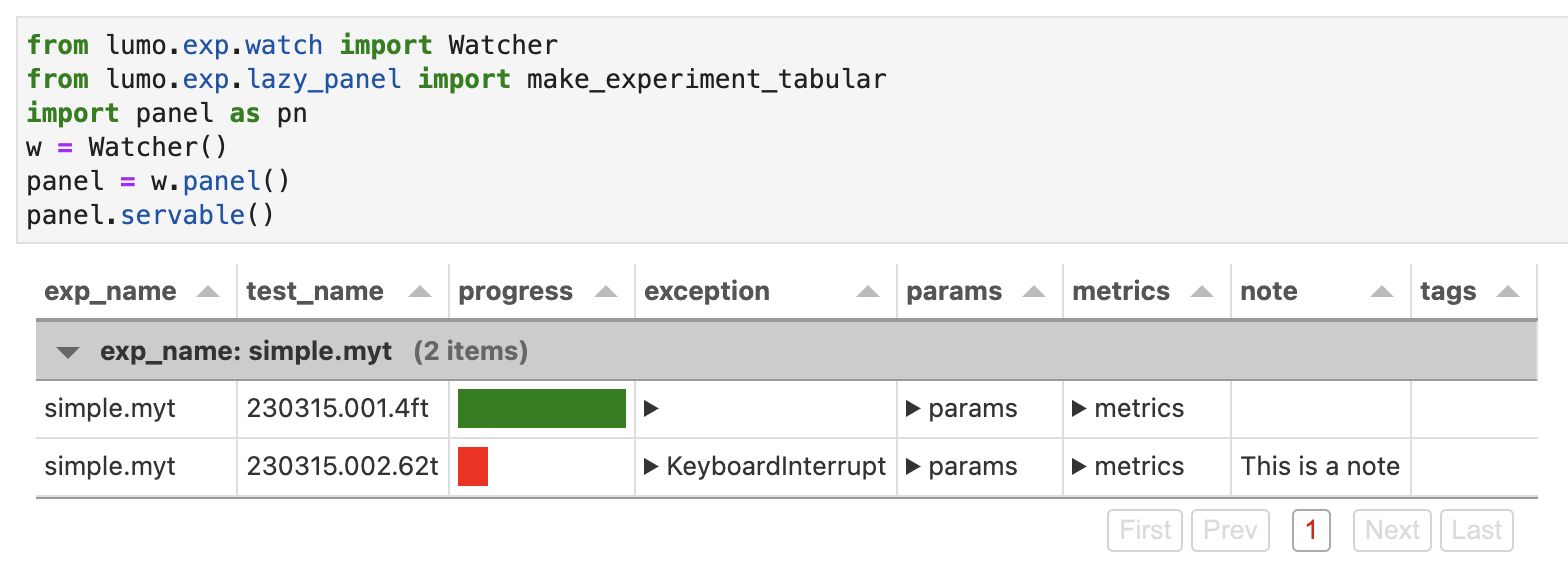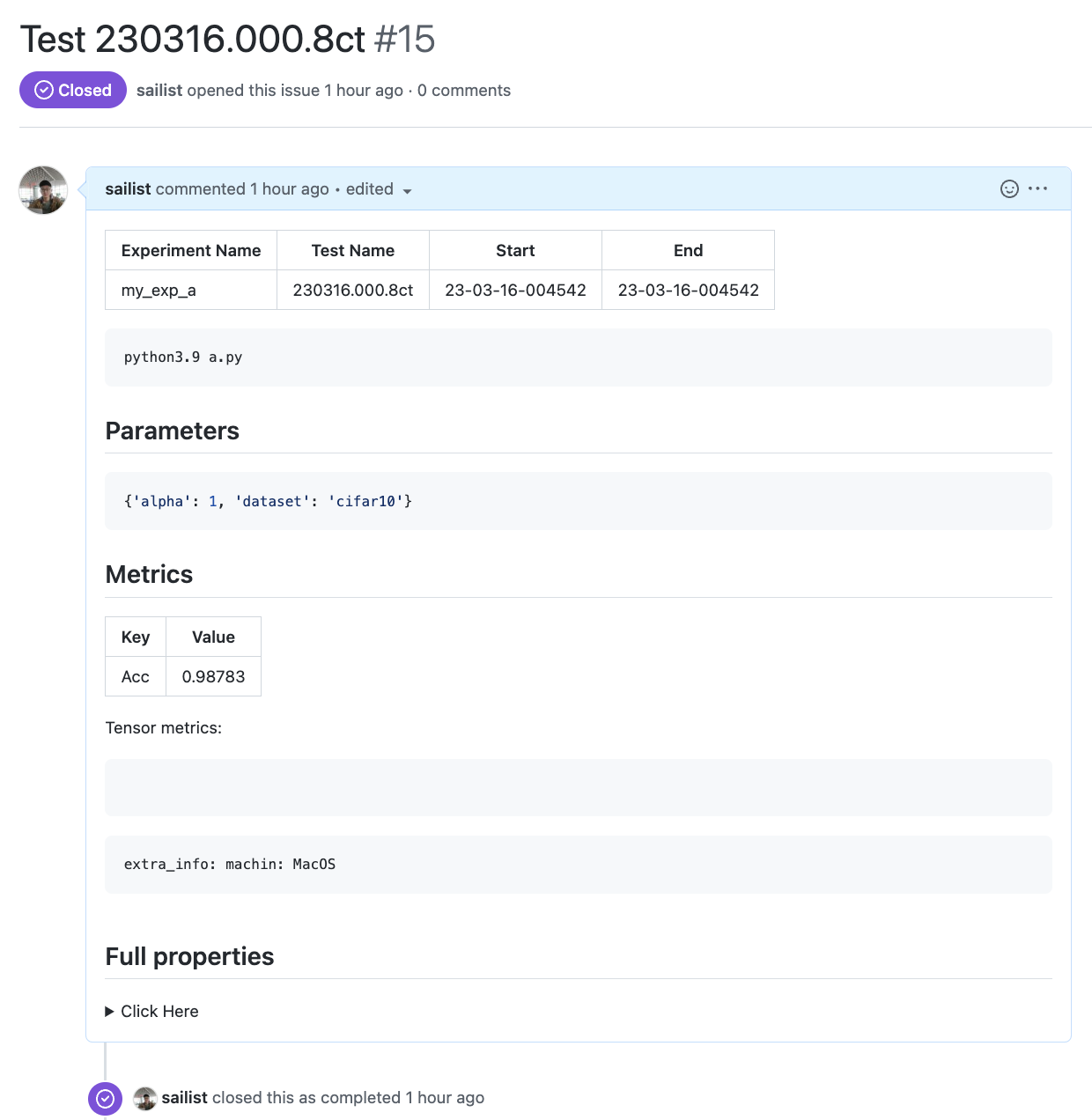lumo is a streamlined and efficient library that simplifies the management of all components required for experiments
and focuses on enhancing the experience of deep learning practitioners.
- Experimental Management: Assign unique id and path for each run, distinguish and store various file types; manage code snapshots through git; record all information generated during the experiment to ensure traceability and reproducibility.
- Parameter Management: Provides more convenient parameter management than argparser based on fire.
- Runtime Configuration: Provides configuration management under multi-level scopes.
- Visualization: Provides an Jupyter-compatible interactive dashboard for experiment management based on Panel.
- Additional optimization for deep learning:
- Training: Provides easily extendable training logic based on Trainer and provides comprehensive callback logic.
- Optimizer: Integrated parameter and optimizer construction.
- Data: Abstraction of dataset construction process, combination of multiple DataLoaders, etc.
- Distributed Training: Also supports multiple training acceleration frameworks, unified abstraction, and easy switching at any time.
- More utilities...
- Type Hint: Support as much as possible for modern IDE's auto-completion.
Install the published and tested version:
pip install -U lumoOr install the latest version from the dev1 branch:
pip install git+https://github.com/lumo-tech/lumo@dev1The experiment panel depends on Panel, which needs to be installed separately:
pip install panel
Here are two classic scenarios:
For existing projects, you can quickly embed lumo by following these steps:
- Import
lumoand initialize Logger and Experiment:
import random
from lumo import SimpleExperiment, Params, Logger, Meter, Record
logger = Logger()
exp = SimpleExperiment(exp_name='my_exp_a')
exp.start()
logger.add_log_dir(exp.mk_ipath())- Initialize parameters:
params = Params()
params.dataset = params.choice('cifar10', 'cifar100')
params.alpha = params.arange(default=1, left=0, right=10)
params.from_args() # python3 train.py --dataset=cifar100 --alpha=0.2
print(params.to_dict()) # {"dataset": "cifar100", "alpha": 0.2}- Record parameters and store information during training:
exp.dump_info('params', params.to_dict())
print(exp.test_name)
params.to_yaml(exp.mk_ipath('params.yaml'))
for i in range(10):
max_acc = exp.dump_metric('Acc', random.random(), cmp='max')
logger.info(f'Max acc {max_acc}')
ckpt_fn = exp.mk_bpath('checkpoints', f'model_{i}.ckpt')
... # save code given ckpt_fn
record = Record()
for batch in range(10):
m = Meter()
m.mean.Lall = random.random()
m.last.lr = batch
record.record(m)
logger.info(record)
exp.end()If you want to start a new deep learning experiment from scratch, you can use lumo to accelerate your code
development.
Below are examples of lumo training at different scales:
one-fine training:
| Example | CoLab | Lines of Code |
|---|---|---|
| MNIST example | 118 | |
| MocoV2 trains CIFAR10 | 284 | |
| Multi-GPU training ImageNet |
Experimental project:
| Project | Description |
|---|---|
| image-classification | Reproducible code for multiple papers with full supervision, semi-supervision, and self-supervision |
| emotion-recognition-in-coversation | Reproducible code for multiple papers on dialogue emotion classification and multimodal dialogue emotion classification |
In jupyter:
from lumo import Watcher
w = Watcher()
df = w.load()
widget = w.panel(df)
widget.servable()Manually filtered experiments for visualization:

You can directly use the command line:
lumo board [--port, --address, --open]
Experiment that failed due to certain reasons can be re-run by using the unique experiment ID (test_name) , extra parameters can be reassigned and replaced.
lumo rerun 230313.030.57t --device=0
Backing up experiment information to a Github issue (based on PyGitHub):
from lumo import Experiment, Watcher
from lumo import glob
glob[
'github_access_token'] = 'ghp_*' # Default value for `access_token`. It is recommended to store the access_token in the global configuration `~/.lumorc.json`.
w = Watcher()
df = w.load()
# Selecting a single experiment for backup
exp = Experiment.from_cache(df.iloc[0].to_dict())
issue = exp.backup('github', repo='sailist/image-classification-private',
access_token='ghp_*',
update=True, # If already backed up, overwrite the previous issue
labels=None, # Optional labels
)
print(issue.number)
# Batch backup and add labels based on each experiment's parameters
issues = df.apply(
lambda x: Experiment.from_cache(x.to_dict()).backup(..., labels=[x['params'].get('dataset', '')]),
axis=1
){'agent': nan,
'backup': {'23-03-17-003438': {'backend': 'github',
'number': 9,
'repo': '...'},
},
'exception': nan,
'execute': {'cwd': '~/Documents/Python/lumo',
'exec_argv': ['~/Documents/Python/lumo/a.py'],
'exec_bin': '~/.pyenv/versions/3.9.16/bin/python3.9',
'exec_file': '~/Documents/Python/lumo/a.py',
'repo': '~/Documents/Python/lumo'},
'exp_name': 'my_exp_a',
'git': {'commit': '1014b6b5',
'dep_hash': 'c93b8c4e340882f55cf0c8e125fa0203',
'repo': '~/Documents/Python/lumo'},
'hooks': {'Diary': {'loaded': True, 'msg': ''},
'FinalReport': {'loaded': True, 'msg': ''},
'GitCommit': {'loaded': True, 'msg': ''},
'LastCmd': {'loaded': True, 'msg': ''},
'LockFile': {'loaded': True, 'msg': ''},
'RecordAbort': {'loaded': True, 'msg': ''}},
'lock': {'accelerate': '0.16.0',
'decorator': '5.1.1',
'fire': '0.5.0',
'hydra': '1.3.2',
'joblib': '1.2.0',
'lumo': '0.15.0',
'numpy': '1.24.2',
'omegaconf': '2.3.0',
'psutil': '5.9.4',
'torch': '1.13.1'},
'note': 'This is a Note',
'params': {'alpha': 1, 'dataset': 'cifar10'},
'paths': {'blob_root': '~/.lumo/blob',
'cache_root': '~/.lumo/cache',
'info_root': '~/.lumo/experiments'},
'pinfo': {'hash': '0af4b77497c85bc5b65ccbdd9ff4ca0f',
'obj': {'argv': ['~/.pyenv/versions/3.9.16/bin/python3.9',
'~/Documents/Python/lumo/a.py'],
'pid': 63975,
'pname': 'python3.9',
'pstart': 1678898740.099484},
'pid': 63975},
'progress': {'end': '23-03-16-004542',
'end_code': 0,
'last_edit_time': '23-03-16-004542',
'ratio': 1,
'start': '23-03-16-004542',
'update_from': None},
'tags': [],
'test_name': '230316.000.8ct',
'trainer': nan}
Distributed under the Apache License Version 2.0. See LICENSE for more information.




